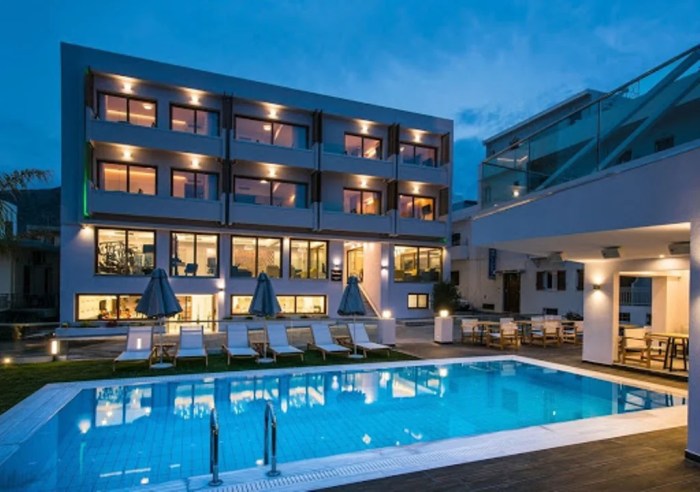Boutique Hotels A Comprehensive Overview
Boutique Hotels represent a unique niche in the hospitality industry, offering a curated and personalized experience that sets them apart from standard hotels. They often prioritize individual character and design over standardized amenities, resulting in a diverse range of experiences for travelers. This exploration delves into the defining characteristics, design elements, target markets, and future trends shaping this dynamic sector.
From their distinctive architectural styles and interior design to their focus on personalized service and unique amenities, boutique hotels cater to a discerning clientele seeking more than just a place to sleep. This examination will analyze how location, target market, and effective marketing strategies contribute to the success of these establishments, while also exploring the competitive landscape and future challenges they face.
Defining Boutique Hotels
Boutique hotels represent a distinct niche within the hospitality industry, offering a curated and personalized experience that sets them apart from standard hotels. They prioritize individuality, style, and often, a focus on a specific theme or local character, creating a unique atmosphere for their guests. This contrasts sharply with the often standardized and mass-market approach of larger hotel chains.The defining characteristics of a boutique hotel experience encompass more than just aesthetically pleasing design.
It’s a holistic approach that integrates exceptional service, unique amenities, and a carefully cultivated ambiance. This often translates to smaller scale properties with a limited number of rooms, allowing for a higher level of personalized attention to each guest. The emphasis is consistently on creating a memorable and intimate stay.
Key Characteristics of Boutique Hotels
Boutique hotels are distinguished by a combination of factors. Their design often features a strong sense of place, reflecting the local culture and architecture. They typically showcase individually designed rooms and suites, avoiding the uniformity often found in larger hotels. Furthermore, boutique hotels often incorporate locally sourced materials and artwork, further enhancing the unique character of the property.
A high level of personalized service, often including concierge-style assistance, is another hallmark of the boutique hotel experience. Finally, many boutique hotels focus on providing a unique and memorable experience through curated amenities such as exclusive spa treatments, specialized dining options, or curated local experiences.
Comparison with Other Accommodation Types
Boutique hotels differ significantly from other accommodation types. Compared to luxury hotels, boutique hotels may not always boast the same level of opulent amenities, focusing instead on curated experiences and personalized service. Luxury hotels often emphasize scale and a wide array of amenities, while boutique hotels prioritize intimacy and unique character. In contrast to inns and bed and breakfasts (B&Bs), boutique hotels generally offer a more sophisticated and polished experience, with a greater emphasis on design and amenities.
Boutique hotels often pride themselves on unique experiences, and this extends to the amenities offered. A key differentiator can be found in the kitchen facilities, where some establishments are incorporating cutting-edge technology; for example, integrating Smart Kitchen Appliances to enhance the guest experience. This allows for greater control and convenience, further elevating the overall stay at these distinctive hotels.
While inns and B&Bs often focus on a homely and comfortable atmosphere, boutique hotels aim for a more stylish and curated experience. The level of service and the range of amenities typically surpasses that of inns and B&Bs.
Target Audience for Boutique Hotels
The target audience for boutique hotels is diverse but generally comprises travelers seeking a unique and personalized experience. This includes discerning travelers who value individuality and appreciate the attention to detail offered by smaller, independent properties. The clientele often includes leisure travelers seeking a memorable vacation, as well as business travelers who appreciate a more refined and intimate setting for their work trips.
Furthermore, boutique hotels appeal to those interested in exploring local culture and immersing themselves in the unique character of a destination, as the hotels themselves often reflect and celebrate this local character.
Boutique hotels offer a unique, personalized experience, often focusing on intimate settings and bespoke services. For those seeking a similar level of luxury on the water, consider the unparalleled experience of Luxury Yacht Rentals , where personalized service and lavish amenities are paramount. Returning to land, the charm of boutique hotels provides a delightful contrast to the boundless ocean, offering a refined and tranquil retreat.
Boutique Hotel Design & Ambiance

Source: thewowstyle.com
Boutique hotels are renowned not just for their personalized service but also for their distinctive design and captivating ambiance. These hotels carefully curate their aesthetic, creating environments that are both stylish and memorable, setting them apart from larger, more generic hotel chains. The design choices directly contribute to the overall guest experience, fostering a sense of individuality and luxury.
Boutique hotels pride themselves on offering unique and personalized experiences for their guests. A key aspect of this personalized service often involves creating the perfect ambiance, and this is where technology plays a crucial role. For instance, integrating a Smart Thermostat allows for precise temperature control in each room, enhancing guest comfort and contributing to the overall luxurious feel of the hotel.
This attention to detail is what sets boutique hotels apart.
Boutique hotel design embraces a diverse range of architectural styles and design elements, often reflecting the local culture and history of their location. From converted historic buildings with exposed brick and original features to modern, minimalist structures with sleek lines and innovative materials, the common thread is a commitment to unique and thoughtfully curated spaces. A strong emphasis is placed on creating an atmosphere that is both inviting and sophisticated, reflecting a specific design philosophy and brand identity.
Unique Design Features Enhancing the Guest Experience
Beyond the overarching architectural style, many boutique hotels incorporate unique design features that elevate the guest experience. These details, often hand-picked and carefully considered, create a sense of luxury and personalized attention. These features are not merely decorative; they contribute to a holistic sensory experience, making the stay more memorable and enjoyable.
| Feature | Description | Example Hotel (Hypothetical) | Image Description |
|---|---|---|---|
| Locally Sourced Materials | Using materials sourced from the surrounding region, reflecting local craftsmanship and sustainability. | The Coastal Cottage | A photograph depicting a hotel lobby with exposed wooden beams, crafted from locally sourced timber, showcasing a rustic yet elegant aesthetic. The walls are adorned with locally made textiles, adding warmth and character. |
| Bespoke Furniture | Custom-designed furniture pieces that are unique to the hotel, adding a touch of individuality and sophistication. | The City Chic | An image showing a hotel room with a uniquely designed headboard crafted from reclaimed wood and upholstered in luxurious velvet. The room features custom-made nightstands and a chaise lounge, all with a consistent design language. |
| Art Installations | Integrating original artwork or curated collections into the hotel’s design, creating an immersive and stimulating environment. | The Artistic Haven | A picture showcasing a hotel hallway displaying a series of large-scale abstract paintings by local artists. The lighting subtly highlights the artwork, creating a gallery-like atmosphere. |
| Unexpected Design Elements | Incorporating unexpected and playful design elements that spark curiosity and conversation, such as a quirky lighting fixture or a vibrant color scheme. | The Whimsical Retreat | An image of a hotel bar with a stunning, uniquely designed chandelier made from recycled materials, creating a focal point and a conversation starter. The bar itself features a vibrant and unexpected color palette. |
The Role of Ambiance and Atmosphere in Creating a Memorable Stay
The ambiance of a boutique hotel is crucial in shaping the guest experience. It’s the intangible feeling that is created through a combination of factors, including lighting, scent, music, and overall design aesthetic. A well-curated ambiance contributes significantly to the hotel’s character and personality, creating a sense of comfort, relaxation, and luxury. A thoughtfully designed space can evoke specific emotions and memories, leading to a more enriching and personalized stay.
Hypothetical Boutique Hotel Concept: “The Urban Oasis”
The Urban Oasis is a boutique hotel concept targeting young professionals and discerning travelers seeking a tranquil escape in the heart of a bustling city. The design philosophy centers on creating a calming and rejuvenating atmosphere within a sophisticated urban setting. The hotel would feature minimalist design with natural materials like wood and stone, complemented by lush indoor plants and calming color palettes.
The ambiance would be characterized by soft lighting, calming music, and subtle aromatherapy, creating a sanctuary from the city’s energy. Key features would include a rooftop garden, a wellness center, and personalized concierge services. The target market appreciates modern design, sustainability, and personalized experiences.
Location and Target Markets
The success of a boutique hotel hinges significantly on its location and the careful selection of its target market. A well-chosen location attracts the desired clientele, enhancing the overall experience and profitability. Conversely, a poorly chosen location can severely limit a hotel’s potential, regardless of its design or amenities. Understanding the interplay between location and target market is crucial for establishing a thriving boutique hotel.Ideal locations for boutique hotels are diverse, reflecting the specific character and target market.
However, several common threads exist. Generally, locations with unique character, accessibility, and proximity to attractions are preferred.
Ideal Locations for Boutique Hotels
Boutique hotels thrive in locations offering a distinct atmosphere and compelling narrative. These locations often boast a rich history, architectural significance, or a vibrant cultural scene. Think charming historic districts in established cities, picturesque coastal towns, or even revitalized industrial areas with unique character. The key is to offer a location that resonates with the hotel’s brand identity and appeals to the target market.
For instance, a boutique hotel emphasizing sustainability might locate near a national park or a region known for its commitment to eco-tourism. Conversely, a hotel focusing on luxury and high-end fashion might choose a location within a prestigious shopping district or a trendy, up-and-coming neighborhood.
Factors Influencing Location Choice
Several key factors influence the choice of location for a boutique hotel. These factors are interconnected and should be carefully weighed against each other.
- Proximity to Attractions and Amenities: Convenient access to key attractions, restaurants, and transportation hubs is essential for attracting guests. A hotel located too far from the main attractions may struggle to attract visitors.
- Local Demographics and Competition: Understanding the local population and existing competition is vital. A detailed market analysis should inform the decision-making process. The presence of similar establishments needs to be considered in terms of competition and differentiation.
- Accessibility and Transportation: Easy access via various transportation modes (airports, train stations, public transport) is crucial for attracting a wider range of guests.
- Infrastructure and Support Services: Reliable utilities, internet connectivity, and readily available support services are crucial for smooth operations.
- Real Estate Costs and Availability: Balancing the desirability of a location with the cost of acquiring or leasing property is crucial for financial viability.
- Local Regulations and Zoning: Compliance with local regulations and zoning laws is paramount to avoid potential legal issues and delays.
Target Markets: Urban vs. Rural Boutique Hotels
Urban and rural boutique hotels often cater to different target markets, although some overlap exists.Urban boutique hotels typically attract business travelers, tourists seeking cultural experiences, and affluent individuals who appreciate the convenience and vibrancy of city life. They might be drawn to hotels located near business districts, museums, theaters, and high-end shopping areas. Marketing strategies might emphasize convenience, proximity to attractions, and access to business amenities.Rural boutique hotels, conversely, often attract leisure travelers seeking relaxation, nature experiences, and a slower pace of life.
These hotels might be located near national parks, vineyards, or other scenic areas. Marketing strategies might focus on tranquility, nature, and opportunities for outdoor activities. Examples include showcasing stunning natural landscapes in marketing materials, emphasizing the hotel’s commitment to sustainability, and offering packages that include outdoor activities.
Marketing Strategies for Specific Target Markets
Effective marketing strategies are crucial for attracting the desired target market. These strategies should be tailored to the specific needs and preferences of each group.For urban boutique hotels targeting business travelers, digital marketing, partnerships with corporate travel agencies, and emphasizing business amenities (meeting rooms, high-speed internet) are key. For leisure travelers in urban settings, social media marketing showcasing the hotel’s unique character and proximity to cultural attractions is important.For rural boutique hotels targeting leisure travelers, showcasing the hotel’s natural surroundings through high-quality photography and videography, partnerships with local tourism agencies, and offering packages that include outdoor activities are effective.
Emphasis on relaxation and escape from the everyday stresses of city life is also beneficial. For instance, a rural boutique hotel might offer a package combining a stay with wine tasting at a nearby vineyard, hiking excursions, or spa treatments.
Services and Amenities
Boutique hotels pride themselves on offering a curated selection of services and amenities designed to enhance the guest experience, often exceeding the standard offerings found in larger hotel chains. This focus on quality over quantity, and personalization over standardization, is a key differentiator in the boutique hotel market. The aim is to create a memorable and unique stay for each individual guest.
Typical services and amenities offered by boutique hotels include comfortable and stylish accommodations, high-speed internet access, 24-hour concierge services, and often include extras like complimentary breakfast, afternoon tea, or evening cocktails. Many also boast on-site restaurants or bars, fitness centers, and spa facilities. The specific offerings vary widely depending on the individual hotel’s concept and target market.
Unique and Exceptional Services
Beyond the standard offerings, boutique hotels often incorporate unique services to elevate the guest experience and foster a sense of exclusivity. These are often tailored to the specific location, design, or theme of the hotel.
- Personalized Concierge Services: Going beyond simple reservations, boutique hotels often provide highly personalized concierge services, anticipating guest needs and arranging bespoke experiences, such as private tours, exclusive dining reservations, or arranging for in-room massages.
- Curated Experiences: Many boutique hotels partner with local artisans, artists, or businesses to offer unique experiences, such as cooking classes, wine tasting sessions, or private art tours. This provides guests with authentic local immersion.
- High-End Amenities: Boutique hotels may offer premium amenities such as high-thread-count linens, luxurious bath products, and state-of-the-art technology, reflecting a commitment to providing a superior level of comfort and convenience.
- Specialized Services: Some boutique hotels cater to specific interests, such as wellness or adventure tourism, offering specialized services aligned with those themes. For example, a wellness-focused boutique hotel might offer yoga classes, meditation sessions, and healthy meal options.
Comparison with Larger Hotel Chains
While larger hotel chains often prioritize efficiency and standardization, boutique hotels emphasize personalized service and unique experiences. Larger chains tend to offer a wider range of amenities, but these are often generic and less tailored to individual guest preferences. Boutique hotels, in contrast, focus on a smaller, more curated selection of high-quality amenities and services, prioritizing exceptional customer service and a unique atmosphere over sheer quantity.
Boutique hotels pride themselves on offering unique and personalized experiences to their guests. A key aspect of providing a secure and comfortable stay often involves sophisticated security measures; consider integrating Home Security Automation systems for enhanced guest safety and peace of mind. This proactive approach allows boutique hotels to further elevate their already high standards of service and guest satisfaction.
| Feature | Boutique Hotel | Large Hotel Chain |
|---|---|---|
| Service | Personalized, attentive, and bespoke | Standardized, efficient, and often impersonal |
| Amenities | Curated selection of high-quality offerings | Wide range of amenities, but potentially generic |
| Atmosphere | Unique, intimate, and stylish | Consistent, but potentially lacking in character |
| Price | Generally higher per night | Generally lower per night, but may require additional purchases |
The Importance of Personalized Service
Personalized service is paramount to the boutique hotel experience. It’s not just about meeting guest expectations; it’s about exceeding them and creating a truly memorable stay. This might involve remembering a guest’s name, anticipating their needs, or offering tailored recommendations based on their interests. Such attention to detail fosters a sense of connection and makes guests feel valued and appreciated, leading to increased guest loyalty and positive word-of-mouth referrals.
For example, a boutique hotel might remember a guest’s preference for a specific type of pillow or coffee and ensure it’s available during their next stay, demonstrating a level of care and attention that is difficult to replicate in larger hotels.
Marketing and Branding
A successful marketing strategy is crucial for any boutique hotel aiming to thrive in a competitive market. It requires a deep understanding of the target audience, a compelling brand identity, and effective utilization of various marketing channels. This involves not only attracting guests but also fostering loyalty and positive word-of-mouth referrals.Effective marketing for a boutique hotel hinges on highlighting its unique selling points – those aspects that differentiate it from larger chain hotels.
This could include exceptional design, personalized service, a prime location, or a curated experience catering to a specific niche. A well-defined brand identity, consistently communicated across all platforms, is fundamental to success.
Key Elements of a Successful Marketing Strategy
A strong marketing strategy for a boutique hotel should incorporate several key elements. These elements work synergistically to build brand awareness, attract potential guests, and ultimately drive revenue. A multi-faceted approach is generally most effective.
Hypothetical Marketing Campaign: The “Coastal Escape” at the Seabreeze Inn
Target Audience: Affluent couples and small groups seeking a romantic and relaxing getaway. They value unique experiences, personalized service, and high-quality amenities.Messaging: The campaign will emphasize the Seabreeze Inn’s luxurious accommodations, stunning ocean views, and intimate atmosphere. The tagline will be “Unwind. Reconnect. Rejuvenate.” Marketing materials will showcase the hotel’s elegant design, personalized service, and exclusive amenities, such as private balconies, spa treatments, and gourmet dining experiences.Channels: The campaign will utilize a mix of digital and traditional marketing channels.
This includes targeted social media advertising (Instagram, Facebook), search engine optimization (), email marketing to past guests and subscribers, partnerships with luxury travel bloggers and influencers, and print advertising in upscale travel magazines. Public relations efforts will focus on securing features in relevant publications.
The Role of Branding in Creating a Unique Identity
Branding is more than just a logo; it’s the overall perception and feeling associated with a hotel. For boutique hotels, branding is paramount in establishing a distinct personality and conveying the unique experience they offer. A strong brand identity differentiates the hotel from competitors and helps attract the right clientele. This involves careful consideration of the hotel’s name, logo, color palette, typography, and overall aesthetic, all working together to create a cohesive and memorable brand.
The brand voice should also be consistent across all communication channels, reflecting the hotel’s personality and values.
Examples of Successful Branding Strategies, Boutique Hotels
The Library Hotel in New York City uses a literary theme throughout its branding, from its decor to its marketing materials, creating a unique and memorable experience for book lovers. This themed approach clearly defines its target market and attracts a specific type of guest. Similarly, many boutique hotels leverage their location and local culture in their branding, highlighting the unique aspects of their surroundings.
A hotel in a historic district might emphasize its connection to the area’s history and heritage in its marketing materials and design. Another example could be a hotel situated in a wine region, incorporating wine-tasting experiences and wine-related decor into its branding. These examples demonstrate the power of crafting a unique and memorable brand identity to attract and resonate with a specific target audience.
Competitive Landscape and Future Trends
The boutique hotel market is a dynamic and competitive landscape, shaped by evolving consumer preferences, technological advancements, and global economic conditions. Understanding the major players, prevailing business models, and emerging trends is crucial for success in this sector. This section will analyze the competitive landscape, highlighting key challenges and opportunities, and exploring potential future trends.
The boutique hotel sector is characterized by a diverse range of business models, each with its own strengths and weaknesses. Some operators focus on independent, owner-operated properties, while others are part of larger hotel groups that leverage brand recognition and centralized management. This diversity leads to a wide range of offerings, from intimate, locally-focused experiences to luxury brands with a global presence.
Analyzing these different approaches reveals key insights into market dynamics and competitive advantages.
Major Players and Trends in the Boutique Hotel Market
The boutique hotel market includes a mix of independent hotels and brands. Independent operators often prioritize unique design and personalized service, creating a distinct identity. Larger hotel chains, recognizing the growing demand, have also entered the market, offering a blend of brand recognition and individual hotel character. Examples include brands like The Hoxton, which maintains a consistent brand identity across multiple locations while preserving the unique character of each hotel, and smaller, independent chains that focus on specific niche markets like eco-tourism or wellness.
Comparison of Boutique Hotel Business Models
Independent boutique hotels often benefit from greater flexibility and control over their operations and branding, allowing them to tailor their offerings to specific local markets and guest preferences. However, they may lack the marketing reach and economies of scale enjoyed by larger chains. Conversely, larger chains offer brand recognition and access to wider distribution networks but might face challenges in maintaining the unique character and personalized service that define the boutique hotel experience.
A successful strategy often involves striking a balance between brand consistency and individual hotel identity.
Challenges and Opportunities Facing the Boutique Hotel Industry
The boutique hotel industry faces challenges including increased competition, fluctuating occupancy rates, rising operating costs, and the need to adapt to changing guest expectations. However, opportunities exist in leveraging technology to enhance the guest experience, focusing on sustainable practices to attract environmentally conscious travelers, and creating unique experiences that differentiate them from larger hotel chains. The rise of experiential travel and the growing demand for personalized service present significant opportunities for boutique hotels to thrive.
Potential Future Trends Shaping the Boutique Hotel Market
Several trends are likely to shape the future of the boutique hotel market. The increasing demand for personalized and localized experiences will drive innovation in service offerings and design. Technology will continue to play a significant role, with hotels adopting smart room technology, mobile check-in/check-out, and personalized guest services through mobile apps. Sustainability and eco-conscious practices will become increasingly important, attracting environmentally aware travelers.
Finally, the rise of the “bleisure” traveler (blending business and leisure) will influence hotel design and amenities, creating spaces that cater to both work and relaxation.
Guest Experience and Reviews
A positive guest experience is paramount for the success of any boutique hotel. It directly influences guest satisfaction, online reviews, and ultimately, the hotel’s reputation and profitability. A well-crafted guest experience fosters loyalty and encourages positive word-of-mouth marketing, which is particularly crucial for smaller, independent boutique hotels.
Key Factors Contributing to a Positive Guest Experience
Several key elements combine to create a memorable and positive stay for boutique hotel guests. These factors often extend beyond the basic provision of accommodation and services, encompassing the overall atmosphere and personalized attention received. Attention to detail, personalized service, and creating a unique atmosphere are crucial differentiators.
- Exceptional Service: Friendly, efficient, and proactive staff who anticipate guest needs and offer personalized recommendations are essential. This could involve remembering guest preferences, offering tailored concierge services, or simply engaging in friendly conversation.
- Unique Ambiance and Design: The hotel’s design and atmosphere should reflect its brand identity and create a distinct and memorable experience. This could involve unique architectural features, carefully curated artwork, or a specific theme that permeates the hotel’s design and services.
- High-Quality Amenities and Services: Providing high-quality amenities such as comfortable bedding, luxurious toiletries, and convenient in-room technology enhances the guest experience. Offering additional services like spa treatments, complimentary breakfast, or curated local experiences further adds value.
- Cleanliness and Comfort: Maintaining impeccable cleanliness throughout the hotel is non-negotiable. Guests expect a clean and comfortable environment, from their room to the common areas. Attention to detail, such as fresh linens and well-maintained facilities, contributes significantly to satisfaction.
- Personalized Touches: Small gestures of personalization, such as a welcome note, a complimentary treat, or a thoughtful amenity, can make a significant difference in a guest’s perception of the hotel. These personalized touches demonstrate that the hotel values its guests and cares about their comfort.
Examples of Positive and Negative Guest Reviews and Common Themes
Analyzing online reviews reveals common themes that contribute to both positive and negative guest experiences. Positive reviews often highlight exceptional service, unique ambiance, and personalized touches, while negative reviews frequently cite issues with cleanliness, poor service, or unmet expectations.
Positive Review Example: “From the moment we arrived, we were treated like royalty. The staff was incredibly friendly and helpful, the room was beautifully decorated and impeccably clean, and the breakfast was delicious. We felt truly pampered throughout our stay. We will definitely be back!”
Boutique hotels often pride themselves on offering unique and personalized experiences for their guests. To enhance this commitment to individualized comfort, many are now incorporating technology, such as integrating Smart Home Devices , into their rooms. This allows for customized lighting, temperature control, and entertainment options, further elevating the guest experience and reinforcing the hotel’s dedication to exceptional service.
Ultimately, this technological integration strengthens the boutique hotel’s brand identity.
Negative Review Example: “The hotel was advertised as luxurious, but our room was outdated and dirty. The staff was unhelpful and unresponsive to our complaints. We were extremely disappointed with our stay and would not recommend this hotel to anyone.”
Common Themes: Positive reviews consistently emphasize exceptional service, comfortable accommodations, and a unique atmosphere. Negative reviews frequently focus on cleanliness issues, poor service, and a lack of attention to detail. Inconsistencies in service quality are also a common complaint.
The Importance of Online Reviews and Reputation Management
Online reviews significantly influence potential guests’ booking decisions. Boutique hotels, often relying on word-of-mouth marketing and online presence, are particularly vulnerable to the impact of negative reviews. Effective reputation management is crucial for maintaining a positive online image and attracting new guests.
Strategies for Improving Guest Satisfaction and Encouraging Positive Reviews
Proactive strategies are essential for enhancing guest satisfaction and encouraging positive online reviews. These strategies focus on anticipating guest needs, addressing concerns promptly, and soliciting feedback.
- Proactive Communication: Engage with guests before, during, and after their stay. This could involve sending pre-arrival emails, providing personalized recommendations, and following up after their departure to request feedback.
- Promptly Address Complaints: Respond to negative reviews promptly and professionally, offering sincere apologies and solutions where appropriate. Demonstrating a willingness to address concerns publicly shows potential guests that the hotel values their feedback.
- Solicit Feedback: Actively solicit guest feedback through surveys, comment cards, or online platforms. Analyzing this feedback helps identify areas for improvement and enhance the guest experience.
- Staff Training: Invest in comprehensive staff training to ensure consistent delivery of high-quality service. This training should cover guest service skills, problem-solving techniques, and the importance of exceeding guest expectations.
- Incentivize Positive Reviews: While not explicitly encouraging fake reviews, offering a small incentive for completing a post-stay review can increase the volume of feedback received.
Epilogue: Boutique Hotels
The boutique hotel industry, characterized by its unique blend of personalized service, distinctive design, and curated experiences, continues to evolve and thrive. While facing challenges such as competition and maintaining consistent brand identity, the focus on creating memorable stays and leveraging effective marketing strategies ensures its continued growth and appeal to a discerning clientele. The future likely holds further innovation in design, technology integration, and sustainable practices, enhancing the already unique and captivating experience offered by boutique hotels.
Essential FAQs
What is the average price range for a stay at a boutique hotel?
The price range varies significantly depending on location, amenities, and overall luxury level. It can range from moderately priced to extremely high-end, comparable to luxury hotels in some cases.
How do I find a boutique hotel that suits my needs?
Online travel agencies and specialized booking websites often filter hotels by type, allowing you to search specifically for boutique hotels. Reading reviews and looking at photos are crucial in assessing whether a hotel’s style and atmosphere align with your preferences.
Are boutique hotels suitable for families?
While many boutique hotels cater to couples or solo travelers, some offer family-friendly options with connecting rooms or suites. It’s always best to check the hotel’s specific amenities and policies before booking.
What are the typical check-in and check-out times at boutique hotels?
Check-in and check-out times generally follow standard industry practices, typically around 3 PM for check-in and 11 AM for check-out. However, it’s advisable to confirm with the specific hotel as policies may vary.









